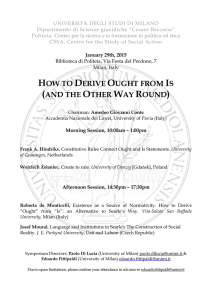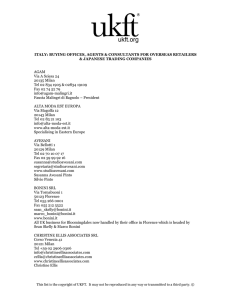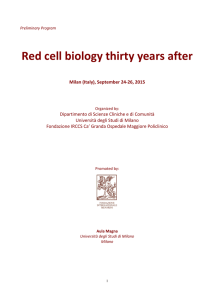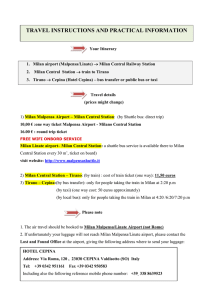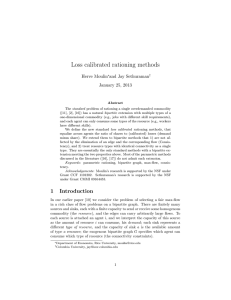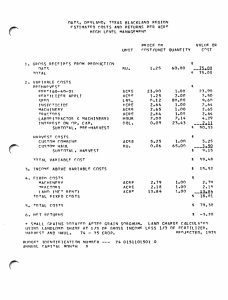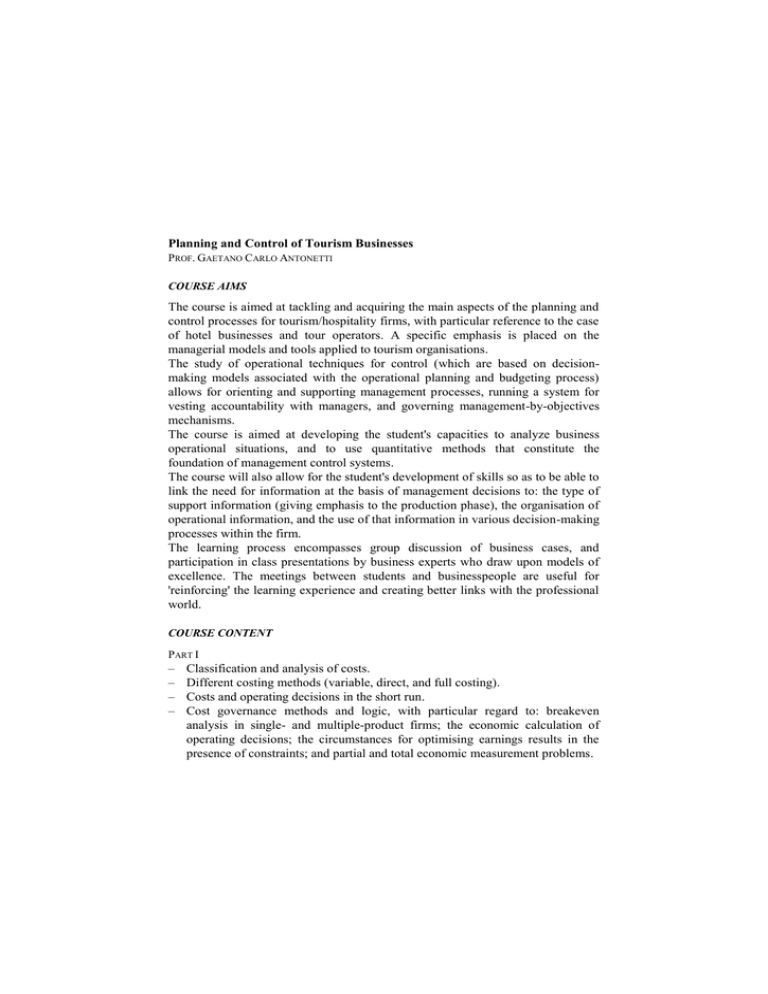
Planning and Control of Tourism Businesses
PROF. GAETANO CARLO ANTONETTI
COURSE AIMS
The course is aimed at tackling and acquiring the main aspects of the planning and
control processes for tourism/hospitality firms, with particular reference to the case
of hotel businesses and tour operators. A specific emphasis is placed on the
managerial models and tools applied to tourism organisations.
The study of operational techniques for control (which are based on decisionmaking models associated with the operational planning and budgeting process)
allows for orienting and supporting management processes, running a system for
vesting accountability with managers, and governing management-by-objectives
mechanisms.
The course is aimed at developing the student's capacities to analyze business
operational situations, and to use quantitative methods that constitute the
foundation of management control systems.
The course will also allow for the student's development of skills so as to be able to
link the need for information at the basis of management decisions to: the type of
support information (giving emphasis to the production phase), the organisation of
operational information, and the use of that information in various decision-making
processes within the firm.
The learning process encompasses group discussion of business cases, and
participation in class presentations by business experts who draw upon models of
excellence. The meetings between students and businesspeople are useful for
'reinforcing' the learning experience and creating better links with the professional
world.
COURSE CONTENT
PART I
–
–
–
–
Classification and analysis of costs.
Different costing methods (variable, direct, and full costing).
Costs and operating decisions in the short run.
Cost governance methods and logic, with particular regard to: breakeven
analysis in single- and multiple-product firms; the economic calculation of
operating decisions; the circumstances for optimising earnings results in the
presence of constraints; and partial and total economic measurement problems.
– Decisions in the long run: techniques for economic evaluation of investments
and capital budgeting.
– Activity-based costing methods.
– Analytical accounting: definition, purposes and logic behind it.
– Management control systems: planning criteria and operational mechanisms.
– The budget as a corporate management and planning tool. Basic tools and
methods for putting together operating budgets. Budgeting for hotels.
– Analysing actual versus budgeted figures for revenues, direct variable costs,
indirect variable costs and fixed costs.
– Management-by-objectives systems and mechanisms for vesting accountability
for earnings results: criteria for organising the areas of responsibility.
Evaluation of operating performance.
– Supply strategies and competitive positioning strategies for hotels.
– Analysis of hotel demand, elasticity of demand versus the price, and sensitivity
of demand with respect to time. The demand/profit relationship for a firm.
– Economic analysis and assessment to support marketing planning. Booking
hotel revenues. Price differentiation techniques to support commercial
decisions in the hotel business: ARGE and revenue management. Hotel pricing
techniques. The structure of pricing mainly used in hotel.
– Analysis of profitability by activity / customer segment.
PART II
– Assignments and cases.
– Discussion of business cases.
– Presentations by corporate personnel.
READING LIST
For practical classes:
G. C. ANTONETTI, Il controllo di gestione nelle imprese turistiche. Casi di costaccounting e
performance analysis, (to be published).
R. H. GARRISON-E. W. NOREEN-P. BREWER-M. AGLIATI-L. CINQUINI, Programmazione e controllo.
Managerialaccounting per le decisioni aziendali, The McGraw-Hill, Milan, 2012.
G. LIBERATORE, Nuove prospettive di analisi dei costi e dei ricavi nelle imprese alberghiere,
F. Angeli, Milano, 2008, 3a reprint (chapter 3).
Collection of case studies, articles and instructional materials (prepared by the lecturer)
available on the Blackboard: http://blackboard.unicatt.it/.
Recommended readings:
A. M. ARCARI (compiled by), Programmazione e controllo, McGraw-Hill, Milan, 2010.
M. FAZZINI, Lo yield management, Franco Angeli, Milan, 2009, 1st reprint.
A. FARCHIONE, Il prezzo. Tecniche, strumenti e strategie, Ipsoa, Milan, 2007.
Reading references for further study:
A. L. SCANNERINI, Tour Operator. Il controllo di gestione, Cedam, Padua, 1993.
D. M. SALVIONI, Le imprese alberghiere. Complessità strutturale e meccanismi di controllo, Giuffrè
Editore, Milan, 1988.
D. COLIN, Management and cost accountng 7th edition, South Western. Cengage Learning EMEA,
London, 2008.
F. AMIGONI (compiled by), Misurazioni d'azienda: programmazione e controllo; Giuffré, Milan,
1995.
G. LIBERATORE, Il controllo di gestione nelle imprese turistico-ricettive, Cedam, Padua, 1993.
L. BRUSA, Attuare e controllare la strategia aziendale. Mappa strategica e BalancedScorecard.
Giuffrè, 2007.
H.K. DAVID-M.A. ALLISHA, Revenue management for the hospitality industry, John Wiley &
Sons Inc., Hoboken, New Jersey, 2010.
P. BASTIA, Sistemi di pianificazione e controllo, Il Mulino, Bologna, 2008.
A. RAVENNA-E. PANDOLFI, Revenue management. Gestione strategica del prezzo per l'ottimizzazione
dei ricavi nell'impresa alberghiera, Ipsoa, Milan, 2010.
R. SIMONS, Sistemi di controllo e misure di performance, Egea, Milan, 2004.
R. H. GARRISON-E. W. NOREEN, Programmazione e controllo per le decisioni aziendali, The
McGraw-Hill, Milan, 2007.
T. HORNGREN-G. L. SUNDEM-W. O. STRATTON, Programmazione e controllo, Pearson/Prentice Hall,
2007.
T. HORNGREN-G. L. SUNDEM-W. O. STRATTON, Esercizi, problemi e casi di programmazione e
controllo, Pearson/Prentice Hall, 2009.
TEACHING METHOD
Lectures designed to facilitate the student's grasp of the material on the subject. Class
discussion of business cases in order to take a more in-depth look at several topics of study.
Assignments about specific topics to incorporate the use of methods and quantitative
instruments; class presentations by managers in the field.
Field assignments and remote instructional methods through the Blackboard.
ASSESSMENT METHOD
Students will be tested through a written exam. The final grade for students attending
class on a regular basis will also take into account class participation in the discussion of
business cases and participation at the class presentations.
NOTES
The prerequisites are those contemplated by the rules for the study plans.
Further information can be found on the lecturer's webpage at
http://docenti.unicatt.it/web/searchByName.do?language=ENG or on the Faculty notice
board.


